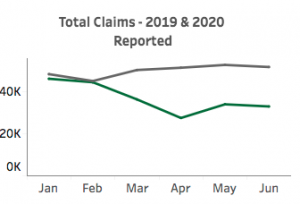Thank you, CWCI. Due to it’s diligence and foresight, we now know:
- through June 30 there were 14,487 COVID claims reported to California’s DWC;
- this amounts to 6.3% of all confirmed COVID cases (data from JHU);
- the vast majority of COVID claims reported have been accepted;
- and perhaps the most important data point…
Total claims (COVID and non-COVID) dropped 28.8% from the first half of 2019 to the first half of 2020. (note this is corrected from my original 36.4%)
Kudos to the fine folk at CWCI; they have produced the first data-based report on all things COVID. It is quite user-friendly, highly credible, and interactive, allowing users to analyze California-specific on COVID and non-COVID claims. The tool enables comparison by industry, body part, nature and cause of injury, class code and region for claims (both filed claims and accepted claims) with dates of injury from 1/1/2020 to 6/30/2020.
The tool also allows users to compare actual claim counts for the same time period in 2019 to current and projected counts for 2020.
Claim counts, dear readers, is WAAAAAY more important than the rather minor financial impact COVID claims have had on workers’ comp. As I’ve reported previously, work comp COVID claims to date are not expensive; despite the prognostications of others, it is unlikely indeed COVID’s costs will have any material impact on work comp financials.
What WILL have an impact – and a very positive one – is the massive drop in total claim counts we’ve seen so far this year.

grey – 2019; green – 2020
Yeah, I know, this is California-specific, and only for half a year, and not fully developed, and all that stuff. I also know a 36% drop in total claim counts is the biggest thing to hit the workers’ comp industry in…forever.
What does this mean to you?
Everything.



In that we do not know of all of the complications of COVID-19, in terms of cardiac scarring or pulmonary fibrosis, or acute kidney injury associated with hypoxia, to say that this will not be a costly endeavor is a tad premature. Kidney transplants, heart replacement surgery, lung transplants are a somewhat more expensive then the routing surgical intervention seen in comp cases, spinal fusion included. Given that this is a pandemic, occupational exposure needs to be closely examined (California presumption notwithstanding). We simply do not know the overall effect of this insidious viral infection.
Hello Donald – thanks for the observation.
I’d suggest that all the research and reporting to date indicates a relatively tiny fraction of patients have experienced significant longer-term (post discharge) health repercussions. While this may change, given the very small number of such patients, plus the fact that the vast majority of those are elderly and likely not working, plus the current cost data that indicates average COVID claim costs are lower than average indemnity costs, it certainly appears the financial impact of COVID will be far less than the financial impact of a collapse in claim counts.
Lastly, I’d suggest we may not KNOW everything about this, so will have to rely on incomplete data. Fortunately CWCI’s research has added much-needed data to our understanding.
Net is too many have been pointing to COVID as a potential calamity, when all the data indicates that concern is way overblown.